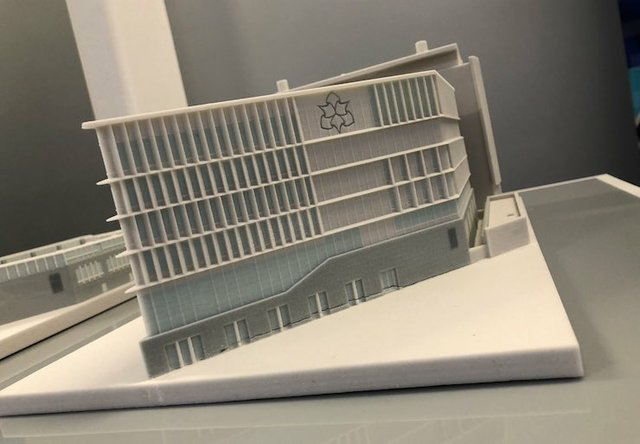
(Source: PrintCityMMU via Twitter)
(来源:PrintCityMMU via Twitter)
In the Summer of 2018, MMU played host to a collection of industry leaders as part of a fact-finding session for a new course to gauge just what they wanted from new people they looked to employ. We wanted to build a totally new course that encouraged problem-solving, creativity, common sense and a mindset that was not afraid to try new ideas. Underneath this would be a foundation of soft-skills development on which to build communication and presentation skills that are essential, not only in this domain, but indeed for every business sector in the world.
2018年夏天,作为一门新课程的实况调查环节,MMU邀请了一批行业领袖,评估他们希望从他们想要雇佣的新员工身上得到什么。我们想建立一个全新的课程,鼓励解决问题、创造力、常识和不怕尝试新想法的心态。在此基础上,我们将建立一个软技能发展的基础,在此基础上建立沟通和演讲的技能,这些技能不仅在这个领域,而且对世界上的每一个商业部门都是至关重要的。
The most viewed talk (66M views) on TED is Sir Ken Robinson's 'Do Schools Kill Creativity?'. He died this August but his legacy is one that made people stop and think about how we teach and what learning actually is. 'Rewiring Education' by John D. Couch gives a more in-depth analysis of how we got to standardised tests at the cost of creativity and the arts. We can sum it up in just three statements: Exploration replaced by expectation, collaboration replaced by competition and discovery replaced by memorisation. A famous US army recruiting slogan was 'Be all you can be' but with these standardised tests, they made you believe at an early age that you were already all you could be.
TED上浏览量最高的演讲(6600万次)是Ken Robinson爵士的《Do Schools Kill Creativity?》他在今年8月去世,但他留下的遗产让人们停下来思考我们如何教学,以及学习到底是什么。John D. Couch所著的'Rewiring Education'更深入地分析了我们是如何以创造力和艺术为代价来进行标准化考试的。我们可以用三句话来概括:探索被期望取代,合作被竞争取代,发现被记忆取代。美军有一句著名的招兵口号是 "做你能做的一切",但通过这些标准化考试,你在很小的时候就会相信你已经做了你能做的一切。
The late and great Douglas Adams had a great relationship with new technologies. He once defined technology as 'stuff that doesn't work yet' and 'anything that is in the world when you're born is normal'. Children born after June 29th 2007 will never know that smartphones were born with them, they are just normal to them but a real challenge for non-digital natives who struggle to get to grips with them. For a moment, imagine someone could not hear you but could see you. You make the 'call me' gesture with your outstretched thumb and little finger but try this with a young person and they won't as readily understand as all their calls are made on a glass slab with no design similarity to a clunky old plastic telephone handset with the microphone and speakers at opposite ends.
已故的伟大人物Douglas Adams与新技术关系匪浅。他曾将科技定义为 "还不能用的东西","你出生时世界上任何东西都是正常的"。2007年6月29日之后出生的孩子永远不会知道智能手机是与生俱来的,智能手机对他们来说只是正常的,但对非数字原住民来说,却是一个真正的挑战。想象一下,有人听不到你的声音,却能看到你。你用伸出的拇指和小指做出 "给我打电话 "的手势,但如果和年轻人一起尝试,他们不会那么容易理解,因为他们所有的电话都是在玻璃板上打的,与笨拙的老式塑料电话听筒的设计没有任何相似之处,麦克风和扬声器在两端。
So with that background for context, our MSc Industrial Digitalisation course was born. Even our admissions criteria changed. Generally, if you want to study Biology for example at university, you need previous entry qualifications in Biology. So what about Industrial Digitalisation? Limiting entry based on what people had done before can prevent them becoming anything else they could be. A class full of students from the same educational route is not one that is fertile with differing opinion and experience so we consider anyone from any course but interview rarely where we need to check suitability.
在这样的背景下,我们的工业数字化硕士课程就诞生了。甚至我们的录取标准也发生了变化。一般来说,比如说你想在大学里学习生物学,你需要有生物学的入门资格证书。那么工业数字化呢?根据人们之前做过的事情来限制入学,可能会阻止他们成为任何他们可能成为的人。一个班级的学生都是来自相同的教育途径并不是一个充满了不同意见和经验的班级,所以我们会考虑任何课程的学生,但很少面试,我们需要检查是否合适。
In the first year of the programme, we were approached by a large sportswear company who agreed to fund a 12-month research project to investigate tennis shoes and ankle injuries in tennis. We put three students on this, one was an engineer, one was a product designer and the other was a business graduate. Without any one of them, we could not have undertaken the project and we saw this as a clear vindication of our entry criteria - it worked. This amalgamation of different academic backgrounds has opened doors the other way too and we now have aspects of 3D printing embedded into programmes around the university, from fashion to furniture design and architecture. Additive manufacturing is just one spoke in the wheel of our course but it provides the perfect vehicle for design, discovery, experimentation and collaboration.
在课程的第一年,一家大型运动服装公司找到了我们,他们同意资助一个为期12个月的研究项目,调查网球鞋和网球运动中的踝关节损伤。我们安排了三个学生参与其中,一个是工程师,一个是产品设计师,另一个是商业毕业生。如果没有他们中的任何一位,我们都不可能承担这个项目,我们认为这是对我们参赛标准的一个明确的证明,它成功了。这种不同学术背景的融合也为我们打开了另一扇门,我们现在已经将3D打印的各个方面嵌入到大学的课程中,从时装到家具设计和建筑。增材制造只是我们课程中的一个辐条,但它为设计、发现、实验和合作提供了完美的工具。
We don't do exams; we use problem-based assessments where students are encouraged to make things but then be able to support and justify their decisions and manufacturing processes to others. Knowing how you made something takes on a whole new value when you have to explain why you made it.
我们不做考试。我们使用基于问题的评估,鼓励学生制造东西,然后能够支持和证明他们的决定和制造过程给其他人。当你必须解释你为什么要制造某样东西时知道你是如何做这件事就有了全新的价值。
Around this, we strongly encourage our students to be unafraid of failure because, once again in the words of Sir Ken Robinson, 'if you're not prepared to be wrong, you'll never come up with anything original'. When students vehemently defend a notion or idea and then back it up with logical reasoning, you know they're ready.
围绕这一点,我们强烈鼓励学生不要害怕失败,因为,再次用Ken Robinson爵士的话说:"如果你不准备犯错,你永远不会有任何创新"。当学生激烈地捍卫一个概念或想法,然后用逻辑推理来支持它,你知道他们已经准备好了。